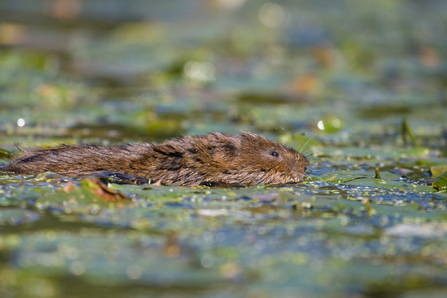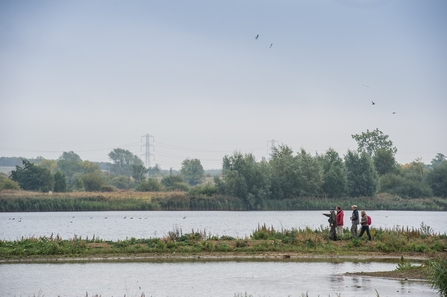
©Tom Marshall

©Tom Marshall
Today Gwent Wildlife Trust (GWT) is arguing the case to save Wales’ own equivalent of the Amazon rainforest, the Gwent Levels. GWT will give their final evidence to the Public Inquiry into a new motorway across a large area of precious wetlands and GWT will cross-examine the Welsh Government’s consultant on sustainable development.
The wildlife charity is trying to halt plans to put a new 6-lane motorway across 15 miles of the Gwent Levels – a proposed bypass around Newport, south Wales – and has summoned a group of experts to provide evidence of the destruction that the new road would cause. It is the UK’s most damaging road building scheme currently under consideration.
The Gwent Levels are set within an historic and highly designated landscape which contains a wealth of rare wildlife such as the UK’s smallest flowering plant, endangered animals such as water voles and cranes which recently bred there having been extinct in Wales for 400 years. The Gwent Levels are officially recognised for their natural value – the ancient landscape which is criss-crossed with ‘reens’ (centuries-old waterways) – has 6 Sites of Special Scientific Interest (SSSIs), a Special Area of Conservation and a National Nature Reserve. All will be either destroyed or badly affected if the new road gets the go-ahead.
Wildlife, transport and sustainability experts argue that:
• The destruction that a new road would cause is disproportionate to the predicted 10 minutes of journey time that will be saved travelling past Newport by 2050.
• The direct effect of 125 hectare of land-take and the fragmentation caused by the proposed six lanes of concrete, steel and tarmac on the Gwent Levels’ habitats would be immense and unprecedented in Wales.
• The proposed M4 bypass would be in breach of current environmental and planning policy - namely the Welsh Government’s Well-being of Future Generations Act and The Environment (Wales) Act.
• The Future Generations Act requires Ministers to take into account the economic, social, environmental and cultural impact of any policy decision.
• The proposed motorway would also have significant indirect effects on the whole of the Gwent Levels – for example the pollution from construction (and traffic) that will enter the ancient, complex and inter-connected waterway systems.
Sustainable Transport specialist and Visiting Professor in the School of the Built Environment at Liverpool John Moores University, Prof. John Whitelegg, gave expert evidence on behalf of GWT and says:
“All the analysis and evaluation of this road project point unequivocally to its rejection. The proposal is a direct attack on nature, biodiversity and protected landscape and fails every test of sustainability.”
Recently, the Future Generations Commissioner for Wales, Sophie Howe, wrote to the Inquiry to object to the M4 plans saying Welsh ministers are misinterpreting their own legislation and could setting a ‘dangerous precedent’ in the way they have interpreted the Future Generations Act.

Matthew Roberts
Chief Executive of Gwent Wildlife Trust, Ian Rappel says:
“In ecological terms the Gwent Levels is Wales’ very own version of the Amazon rainforest and should be protected for people and wildlife, now and for future generations. Welsh Government say that the proposed M4 scheme is ‘sustainable’ but admit that the scheme does not have ‘respect for environmental limits’. However, ‘not respecting environmental limits’ is the very definition of unsustainability.
“The motorway would rupture the essential cohesion of the Gwent Levels, acting as an impermeable barrier to all flightless wildlife and a dangerous permeable barrier to flying wildlife such as rare bats and bumblebees. It would snap the protected habitat like a cracker in two, isolating wildlife populations on either side of the divide, devaluing the habitat on both sides of the motorway making both populations smaller and more vulnerable to local extinction.”
For the past nine months, Gwent Wildlife Trust (GWT) and Wildlife Trust Wales (WTW) have played a lead role at the ongoing Public Inquiry. GWT were the only statutory non-governmental organisation objector to appear at the Inquiry – as they own Magor Marsh nature reserve which would be badly affected by the new road and which lies within two SSSIs. GWT have received a compulsory purchase order for parts of the Barecroft Common section of their Nature Reserve.
GWT’s Magor Marsh is one of the last remaining areas of natural fenland that once covered the Gwent Levels. A complex network of waterways and marshy grassland. GWT reintroduced water voles to the reserve in 2011, returning them to a landscape they would have once flourished in. Once thought extinct in the area, water voles can now be seen once again feeding by the water’s edge. The water voles and other species including dragonflies, bearded tits, warblers, and the rare shrill carder bees are at risk, if plans for the M4 go ahead. Thousands of people visit and enjoy the tranquility of Magor Marsh every year – this will be jeopardized if the new road is built.
Editor’s notes:
Gwent Wildlife Trust will appear before the M4 Inquiry on September 26-27.
GWT’s campaign against the M4 has gained support from thousands of people, including Welsh TV naturalist Iolo Williams who gave evidence to the Inquiry talking about how it would be destroy precious breeding and feeding grounds for otters, water voles and nesting cranes. GWT’s Chief Executive Ian Rappel wrote a powerful blog for British Wildlife about the proposed M4.
As the lead NGO, GWT has worked tirelessly throughout the Inquiry, advising smaller charities and people also in opposition to the M4. GWT offered advice and helped to supply witnesses to the Inquiry from a wide range of expertise. These included environmental issues linked to: Magor Marsh Nature Reserve, ecology, bats, otters and the 800 or so recorded invertebrates which would be impacted by the plans. You can read some of the evidence and submissions by experts here.
During the Inquiry, Welsh Government suggested the economic and transport-related need for a new motorway and to counter this GWT and WTW worked with academics. GWT gathered together a group of expert witnesses of international repute, who have helped us in our battle to try to save the Levels and its wildlife.
From eminent transport economists, to climate change and sustainable development experts, the Inspectors heard our side of the story from a range of university professors and lawyers. GWT also submitted a series of written statements setting out our concerns about the proposed M4 project, addressing such topics as water quality and quantity, cumulative impact and protected species of wildlife.
An army of GWT supporters and volunteers, Campaign Against Levels Motorway (CALM) members and staff from GWT, liaised with our witnesses, arranged notetaking, proof-read written material, and provided a key link with the administrators of the Inquiry, which was vital in keeping momentum going for our campaign. Students from the Cardiff Law School also did a sterling work note-taking during the Inquiry, which kept us fully up to speed with the proceedings.
GWT’s part in the Inquiry ends on Sept 27 but the battle to save the Gwent Levels goes on…
The Inquiry is now expected to run until the end of the year. The Inspector’s recommendation will go to the Welsh Government Minister Ken Skates who has the final say on whether or not the M4 project goes ahead. Mr Skates can agree or disagree with the inspector whichever way he recommends, so ultimately the decision will be a political one.
You can show your support for the campaign by signing a petition here.
You can also help by raising the profile of the Gwent Levels and Magor Marsh. Post your photos and videos of the area and its amazing wildlife and voice your opposition of the M4 plans using Twitter and Facebook. Please use the hashtags #LoveTheLevels #NoNewM4
Support Gwent Wildlife Trust – see their webpage here!